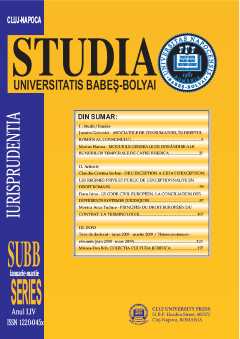TEORIA OBIECTULUI JURIDIC ÎN DREPTUL PENAL – ÎNTRE EXIGENŢĂ ŞI DERIZORIU
THE OFFENSE PRINCIPAL THEORY IN CRIMINAL LAW – BETWEEN EXIGENCY AND UNSUBSTANTIAL
Author(s): Alexandru RîşniţăSubject(s): Law, Constitution, Jurisprudence
Published by: Studia Universitatis Babes-Bolyai
Keywords: juridical object; protected social value; imorallity; illegality; ratio legis.
Summary/Abstract: The offense principal theory in criminal law – between exigency and unsubstantial. The current article has set its aim to surpass the Romanian doctrine’s standstill concerning “The juridical object theory” (in a more acurrate legal translation “The Offense Principle Theory”) especially by analyzing the manner in which other legal systems embrace and understand this concept. The study starts by exploring the origins, the conceptual definition and the existing phylum outlined by the world’s most prestigious scholars. Moving on, the author analyzes both the old and the current Romanian view in matter of “juridical objects”. Both during and subsequent to this examination, the author is aptly devoted to expressing a series of compulsory critics concerning the different approaches regarding the subject. After scrutinizing all the basic issues surrounding this matter, the writer firmly distinguishes between immorality and illegality, the juridical object and the norm’s ratio legis, culminating with juxtaposing the Constitution with all the above. Subsequent to this analysis, the author asks and answers the following question: “Are there crimes without a “juridical object”?”. After strongly debating this matter, the writer sums up by presenting the practical uses of the Theory and a short conclusion regarding all the above-mentioned subjects.
Journal: Studia Universitatis Babes Bolyai - Iurisprudentia
- Issue Year: 59/2014
- Issue No: 2
- Page Range: 129-170
- Page Count: 42
- Language: Romanian

